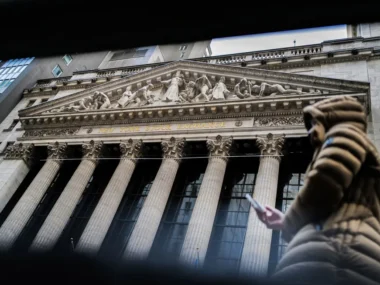New data reveals that the United Kingdom’s economy has experienced a more rapid growth rate since the onset of the COVID-19 pandemic than originally anticipated.
Revised data suggests that the United Kingdom has experienced faster economic growth than France or Germany since the end of 2019.
These growth figures were expected to be revised upward after the Office for National Statistics (ONS) recently published new estimates of the economy’s performance since the onset of COVID-19.
Nevertheless, analysts pointed out that the UK is still grappling with sluggish growth.
According to the latest ONS figures, the UK’s economy has expanded by 1.8% since the pandemic began, a significant shift from the previous estimate of a 0.2% contraction. Additionally, it was reported that the economy grew by 0.3% in the first three months of this year, up from the previous estimate of 0.1%. The estimate for the April-to-June quarter remained unchanged at 0.2%.
In light of these revisions, ONS chief economist Grant Fitzner stated that the UK’s growth rate has seen “almost no change over the past 18 months.”
- What does GDP stand for, and what impact does it have on my life?
- The major issue hindering the British economy’s progress.
- A think tank predicts that the United Kingdom is on course for historically high tax levels.
The size of an economy is typically measured using Gross Domestic Product (GDP), which aims to encompass all the economic activities of companies, governments, and individuals within a country.
The Office for National Statistics (ONS) periodically revises GDP figures as it receives more data about the country’s economic performance. Earlier this month, the ONS indicated that it had obtained “richer data” from its annual survey, leading it to estimate that the UK’s economy was larger than previously believed in the final three months of 2021 compared to the pre-pandemic period.
These revised figures now suggest that the UK’s economic growth since the pandemic has outpaced that of France (1.7%) and Germany (0.2%).
Chancellor Jeremy Hunt responded to this data by highlighting that the UK’s economic recovery from the pandemic was faster than initially anticipated, asserting that the UK was one of the quickest G7 nations to bounce back.
However, Ruth Gregory, Deputy Chief UK Economist at Capital Economics, downplayed the significance of the latest ONS release, noting that the economy remained only 0.6% larger than a year ago. She emphasized that the overall picture still showed the UK trailing behind most G7 countries, except for Germany and France, since the start of the pandemic, and raised concerns about the impending impact of rising interest rates.
Samuel Tombs, Chief UK Economist at Pantheon Macroeconomics, pointed out that international comparisons might take some time to stabilize, given that statistical authorities in other countries were also revising their economic data.
Recent GDP figures indicated a 0.5% contraction in the UK’s economy in July, attributed to a combination of strike action and adverse weather conditions, raising concerns about the economy’s recent underperformance. However, Mr. Tombs expressed optimism that the UK would likely avoid a recession in the second half of the year, partially due to a slowdown in the rate of consumer price inflation.











